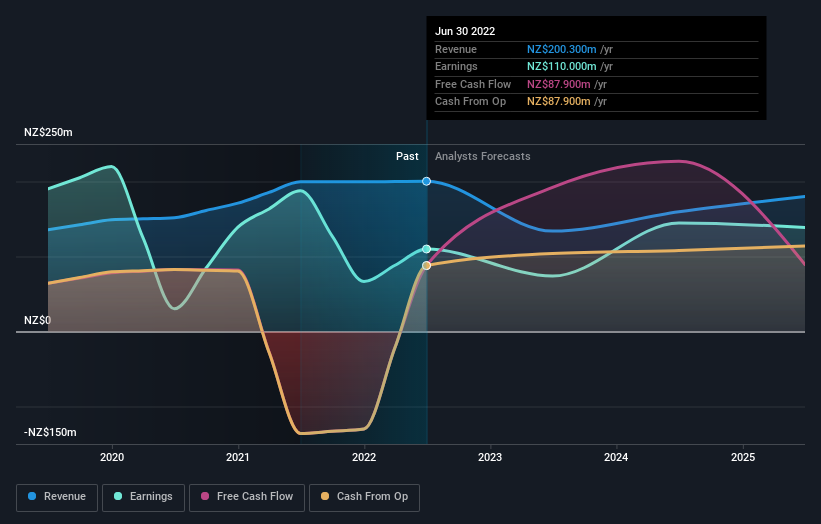- New Zealand
- /
- Office REITs
- /
- NZSE:PCT
individual investors who own 52% along with institutions invested in Precinct Properties New Zealand Limited (NZSE:PCT) saw increase in their holdings value last week

A look at the shareholders of Precinct Properties New Zealand Limited (NZSE:PCT) can tell us which group is most powerful. And the group that holds the biggest piece of the pie are individual investors with 52% ownership. In other words, the group stands to gain the most (or lose the most) from their investment into the company.
Following a 3.9% increase in the stock price last week, individual investors profited the most, but institutions who own 48% stock also stood to gain from the increase.
Let's delve deeper into each type of owner of Precinct Properties New Zealand, beginning with the chart below.
See our latest analysis for Precinct Properties New Zealand

What Does The Institutional Ownership Tell Us About Precinct Properties New Zealand?
Many institutions measure their performance against an index that approximates the local market. So they usually pay more attention to companies that are included in major indices.
Precinct Properties New Zealand already has institutions on the share registry. Indeed, they own a respectable stake in the company. This implies the analysts working for those institutions have looked at the stock and they like it. But just like anyone else, they could be wrong. It is not uncommon to see a big share price drop if two large institutional investors try to sell out of a stock at the same time. So it is worth checking the past earnings trajectory of Precinct Properties New Zealand, (below). Of course, keep in mind that there are other factors to consider, too.

Hedge funds don't have many shares in Precinct Properties New Zealand. AMP Haumi Management Limited is currently the company's largest shareholder with 15% of shares outstanding. Accident Compensation Corporation, Asset Management Arm is the second largest shareholder owning 6.8% of common stock, and Guardian Trust Funds Management holds about 4.5% of the company stock.
A deeper look at our ownership data shows that the top 25 shareholders collectively hold less than half of the register, suggesting a large group of small holders where no single shareholder has a majority.
Researching institutional ownership is a good way to gauge and filter a stock's expected performance. The same can be achieved by studying analyst sentiments. There are a reasonable number of analysts covering the stock, so it might be useful to find out their aggregate view on the future.
Insider Ownership Of Precinct Properties New Zealand
While the precise definition of an insider can be subjective, almost everyone considers board members to be insiders. Management ultimately answers to the board. However, it is not uncommon for managers to be executive board members, especially if they are a founder or the CEO.
Insider ownership is positive when it signals leadership are thinking like the true owners of the company. However, high insider ownership can also give immense power to a small group within the company. This can be negative in some circumstances.
Our data suggests that insiders own under 1% of Precinct Properties New Zealand Limited in their own names. Keep in mind that it's a big company, and the insiders own NZ$2.3m worth of shares. The absolute value might be more important than the proportional share. Arguably, recent buying and selling is just as important to consider. You can click here to see if insiders have been buying or selling.
General Public Ownership
The general public, mostly comprising of individual investors, collectively holds 52% of Precinct Properties New Zealand shares. With this amount of ownership, retail investors can collectively play a role in decisions that affect shareholder returns, such as dividend policies and the appointment of directors. They can also exercise the power to vote on acquisitions or mergers that may not improve profitability.
Next Steps:
While it is well worth considering the different groups that own a company, there are other factors that are even more important. Consider for instance, the ever-present spectre of investment risk. We've identified 3 warning signs with Precinct Properties New Zealand (at least 1 which doesn't sit too well with us) , and understanding them should be part of your investment process.
If you would prefer discover what analysts are predicting in terms of future growth, do not miss this free report on analyst forecasts.
NB: Figures in this article are calculated using data from the last twelve months, which refer to the 12-month period ending on the last date of the month the financial statement is dated. This may not be consistent with full year annual report figures.
New: Manage All Your Stock Portfolios in One Place
We've created the ultimate portfolio companion for stock investors, and it's free.
• Connect an unlimited number of Portfolios and see your total in one currency
• Be alerted to new Warning Signs or Risks via email or mobile
• Track the Fair Value of your stocks
Have feedback on this article? Concerned about the content? Get in touch with us directly. Alternatively, email editorial-team (at) simplywallst.com.
This article by Simply Wall St is general in nature. We provide commentary based on historical data and analyst forecasts only using an unbiased methodology and our articles are not intended to be financial advice. It does not constitute a recommendation to buy or sell any stock, and does not take account of your objectives, or your financial situation. We aim to bring you long-term focused analysis driven by fundamental data. Note that our analysis may not factor in the latest price-sensitive company announcements or qualitative material. Simply Wall St has no position in any stocks mentioned.
About NZSE:PCT
Precinct Properties NZ & Precinct Properties Investments
Precinct is New Zealand’s only listed city centre specialist investing predominantly in premium and Agrade commercial office property.
Average dividend payer and fair value.
Market Insights
Community Narratives



